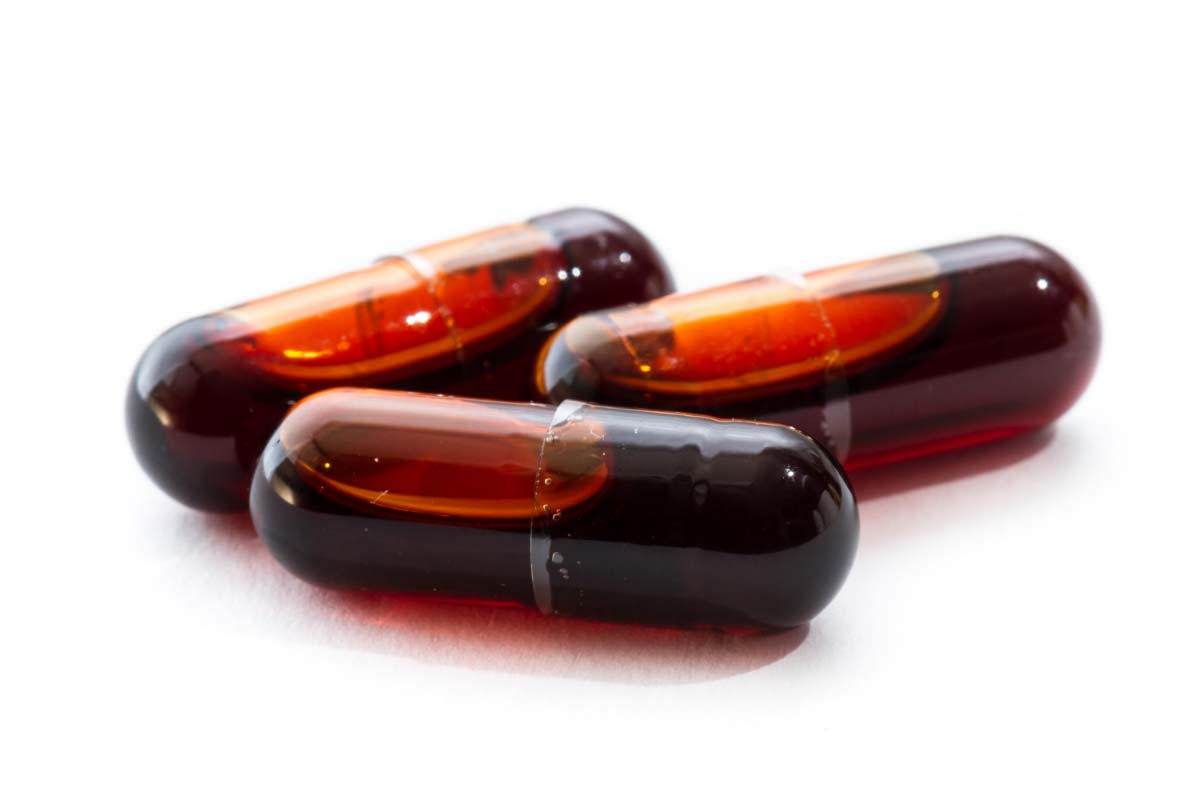Krill oil is a substitute for fish oil that has been shown to reduce stress, lower cholesterol and improve depression. It is extracted from small crustaceans (called Krill) that feed on phytoplankton and swim in large schools of 30,000 (1).
Krill oil is very similar to fish oil, providing high doses of omega-3 fatty acids, particularly eicosapentaenoic acid (EPA) and docosahexaenoic acid (DHA). The main difference between the two is that krill oil contains high levels of choline while regular fish oil does not (2).
Rankings
1. 1MD Antarctic KrillMD
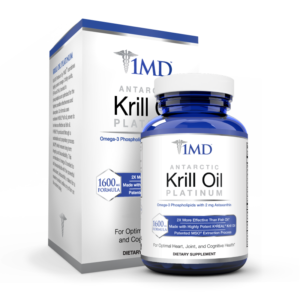
KrillMD features pure, sustainable Antarctic krill oil with the highly potent omega-3 fatty acids EPA and DHA as well as the powerful antioxidant astaxanthin and krill phospholipids to maximize efficient and effective absorption by the body.
KrillMD contains 1600 mg per serving, derived only from Antarctic krill, using a Multi-Stage Oil (MSO) extraction technology to boost absorption. Healthtrends #1 pick.
2. Transparent Labs CoreSeries Krill Oil
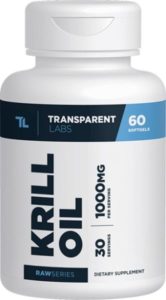
CoreSeries krill oil is an elite health supplement extracted exclusively from an Antarctic krill species (Euphausia Superba) rich in the long-chain omega-3 fatty acids EPA and DHA.
Krill oil is attached to phospholipids, instead of triglycerides (like in fish oil), permitting them to be better recognized by the body and gentler on the stomach, allowing for better assimilation into the cells.
3. Neptune Krill Oil
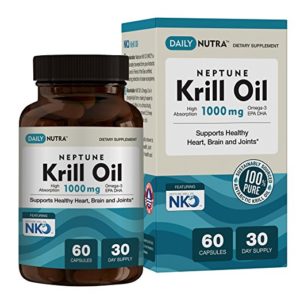
Neptune is a well respected company that has been funding a lot of the research over the years, regarding krill oil – so they know exactly what they are doing.
Their supplement contains phospholipid omega-3s and astaxanthin at very high dosages per capsule. It’s small pills also help to eliminate fishy burps and any aftertaste.
4. SR Antarctic Krill Oil

Sports Research is made with Superba2 Krill Oil, a new advance formula clinically proven to increase omega-3 fatty acid levels in the body. It contains 1000 mg of Krill oil per soft gel with more naturally occurring EPA, DHA, Phospholipids, and Astaxanthin.
The new Superba2 formula has substantially reduced the Krill smell. The phospholipid-bound omega-3 fatty acids are water dispersible, making them easier to digest than fish oil.
5. Mega Red Krill Oil
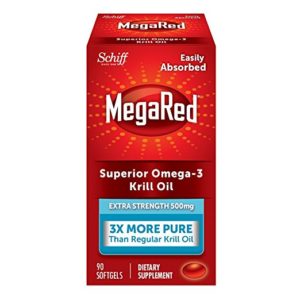
Mega red superior krill oil is one of the most popular brands on amazon. It provides a once-daily soft gel with 350 milligrams of 100 Percent Antarctic krill oil. Unlike fish oil, MegaRed Krill Oil has no fishy odor or aftertaste.
They’ve also included Astaxanthin which provides carotenoid and antioxidant benefits.
6. Viva Naturals Krill Oil
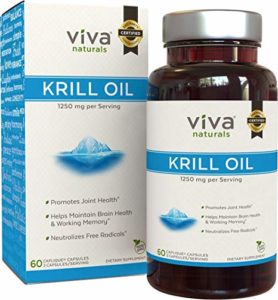
In just two easy-to-swallow capsules, Viva Naturals Krill Oil delivers 1,250 mg of krill oil, providing 165 mg of EPA and 90 mg of DHA. With its high concentration of omega-3’s, including 90 mg of DHA, Viva Naturals Krill Oil can help you maintain a healthy brain, including much-needed support for your working memory.
It’s also encapsulated in innovative Caplique capsules, limiting the fishy burps and aftertaste often experienced with lower-quality fish oil supplements.
7. Bronson Antarctic Krill Oil
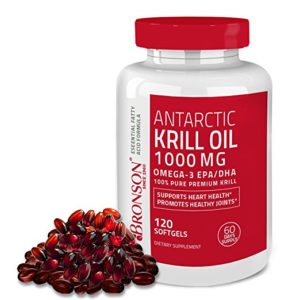
Bronson only uses the best krill harvested in the waters of Antarctica to promote healthy cholesterol levels, helps to reduce blood pressure. Bronson uses the best ingredients available. Bronson krill oil is heavy metal tested, non-GMO, gluten-free, soy-free and is laboratory tested at a New York FDA cGMP registered facility.
Their products have been consistently recommended by the foremost nutritional scientists like Nobel Prize winner, Dr. Linus Pauling.
8. Bulletproof Krill Oil Complex
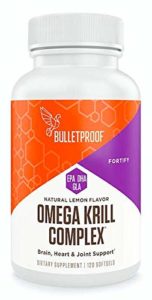
Bulletproof omega krill complex is a triple strength blend of omega-3s made with fish roe and krill sourced from certified ocean-friendly fisheries. It is also enhanced with GLA plus extra antioxidants from astaxanthin and olive fruit for the clinically backed brain, heart, and joint support.
The GLA in Omega Krill Complex comes from borage seed (Borago officinalis), the highest-potency natural source of GLA available.
9. Natrogix Krill Oil
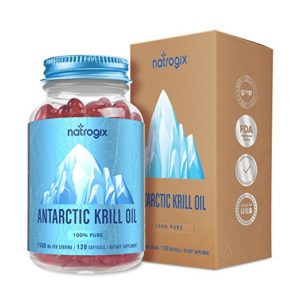
Natrogix’s Krill Oil delivers 1500mg serving; each serving is tested including 123.5mg phospholipid omega-3’s, 420mcg astaxanthin.
Beyond this, it doesn’t have anything special to distinguish itself from its competitors.
10. Dr. Mercola Krill Oil
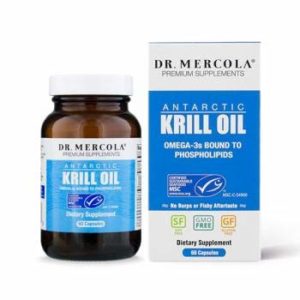
Dr. Mercola’s krill oil is a premium omega-3 supplement that supports a healthy heart, overall joint comfort, and immune function.
Their MSC certification and auditing ensures harvesting to manufacturing adheres to MSC’s chain of custody standard. Krill are harvested in a sustainable way that also ensures no non-krill species is captured.
How We Rank
The first we looked at for ranking the best krill oil supplements was the DHA and EPA content (also known as the omega-3 essential fatty acids). They’re known as essential fats because our bodies can’t produce EPA and DHA and if we were to remove them from our diets completely, we’d eventually die.
A combined intake of 500 milligrams to 1.8 grams of EPA and DHA per day is sufficient, and additional health benefits can be seen up to a combined intake of 6 grams per day. This is why popular companies like Bulk Supplements did not make the cut because they contained just 200mg of EPA and DHA per serving.
Next, we looked it astaxanthin content in the krill oil supplement. Astaxanthin is what gives krill oil its distinctive deep red color and it a powerhouse antioxidant. It’s one of the main advantages of choosing a krill oil supplement over a fish oil one. We preferred those with high astaxanthin content like out top pick 1MD Krill Oil.
Lastly, we looked at purity and additives. Did the fish oil contain beneficial ingredients to supercharge their product and make sure they were using FDA standards and sustainable fishing methods? Products like Krill Oil Superba, which made our top 3, use only sustainable fishing methods, protecting the environment while still providing a quality product.
After all that, we got to our top 10 best krill oil supplements on the market.
Benefits
1. Krill oil may help control and lower inflammation by reducing C-reactive protein levels. A 2007 study in the Journal of the American College of Nutrition found that taking krill oil for 30 days led to a slight reduction in c-reactive protein levels in people suffering from rheumatoid arthritis (3).
C-reactive protein is a plasma protein that is produced in the liver (4).
It rises in response to inflammation, and often it is seen as a marker for inflammation-related conditions such as cancer or cardiovascular disease (5).
It’s not just krill oil that appears to have an effect on c-reactive protein levels though, fish oil may also have an effect, though there are more studies that didn’t find a link then there are ones that did (6, 7, 8, 9).
Even krill oil has had mixed results, so far the study we mentioned above is the only one that saw a difference (though the difference was significant) and that was only in people with rheumatoid arthritis.
Another study, this time on 115 healthy volunteers, failed to find any significant difference in c-reactive protein levels after 1-6 months (10).
It might just be the case that krill oil reduces inflammation in people with arthritis and similar joint issues, which in turn reduces c-reactive protein levels.
2. Krill oil can help lower bad cholesterol and increase good cholesterol. Cholesterol can be split up into two types; high-density lipoprotein (HDL) and low-density lipoprotein (LDL) cholesterol, also known as “good cholesterol” and “bad cholesterol”, combined together they make your total cholesterol levels. Increasing your HDL levels can help to lower your LDL cholesterols because one of the main functions of HDL cholesterol is to clear LDL from your artery walls.
Therefore increasing HDL will help to lower LDL levels. This may reduce total cholesterol levels, but provided you are increasing good cholesterol and lowering bad cholesterol it doesn’t matter so much if your total cholesterol levels change.
A 2004 study found that 1-3g of krill oil per day for a period of 1-6 months led to significant reductions in total cholesterol, LDL cholesterol, and triglycerides. HDL cholesterol was also increased (11).
The study also claimed that krill oil was much more effective than regular fish oil. Which has also been found to increase HDL cholesterol reduce LDL cholesterol, and also reduce total cholesterol (12, 13, 14).
The fact that krill oil is more effective than fish oil is probably just down to it having a higher bioavailability.
3. Krill oil can help to reduce blood pressure in people with high blood pressure. High blood pressure, also known as hypertension is a serious medical condition that can lead to heart disease, strokes, and heart failure (to name a few).
The evidence of fish oil reducing high blood pressure is mixed. We’ve already looked at the effect of krill oil on total cholesterol and LDL cholesterol levels. Reducing cholesterol is one way of reducing hypertension, so there is definitely a connection.
One study found that 2.5g of fish oil per day for six weeks led to a reduction in triglycerides and in blood pressure (15).
A meta-analysis in 2013 found that there was a significant reduction in blood pressure seen in people who were hypertensive (16).
The study also found that there was a small (non-significant) reduction in blood pressure in regular healthy people.
A 2012 study gave either fish oil or a soya product to women with metabolic syndrome over a 90-day period. The study found that there was a statistically significant drop in diastolic blood pressure (17).
4. Krill oil can help reduce the symptoms of depression. Depression has been linked with inflammation and increases in c-reactive protein in some studies (18).
So it is perhaps no surprise that fish oils have been shown to reduce the symptoms of depression. Krill oil hasn’t specifically been linked, but that is most likely down to a lack of studies. But there are many studies that link fish oil, so it is fair to assume that krill oil will produce the exact same results.
A 2011 study found that omega-3 fatty acids were an effective treatment for depression (19).
Another study in 2002 noticed a significant effect of omega-3 fatty acids on the recurrent unipolar depressive disorder (20).
Of course, depression has been linked with high cortisol levels due to stress (21).
As we have already discussed, fish oil and krill oil have been linked with reduced stress, and there are many studies linking fish oil to reduced cortisol (22).
5. Krill oil may help reduce joint pain. We’ve already covered this somewhat by talking about the effect that krill oil has on inflammation and c-reactive protein. But it is important to distinguish this as omega-3 supplements are often taken for joint health.
A meta-analysis on omega-3 supplements and the effect they have on inflammatory joint pain was completed in 2007 (23). It found that omega-3 supplements “are an attractive adjunctive treatment for joint pain associated with rheumatoid arthritis”.
6. Krill oil may help improve birth weight and reduce preterm birth incidence. Taking fish oil while pregnant seems to have a few benefits, though more evidence is definitely needed before we can say for certain.
An article in 2011 stated that omega-3 fatty acids can “increase gestation length and improve infant cognitive and visual performance” (24).
He went on to state that “adequate levels of omega-3 fatty acids have also been shown to reduce the incidence of preterm birth in some populations”.
7. Krill oil may reduce inattention and hyperactivity in children with ADHD. Attention deficit hyperactivity disorder (ADHD) may be improved by omega-3 fatty acids. A 2003 study found that 4 months of omega-3 fatty acid supplementation led to a reduction in hyperactivity and disruptive behavior in children with hyperactivity disorder (25).
Another study published found that dietary omega-3 supplementation (using margarine with added omega-3) in boys with ADHD and boys without ADHD led to an improved score in the child behavior checklist (CBCL) (26).
The study also found that boys with ADHD had slightly improved attention.
This study has some funding issues, however. It was bankrolled by Unilever, a well-known consumer goods company that happens to sell margarine as one of its products. That does not mean that the results are worthless though, particularly when you consider that other studies like the one we mentioned earlier found similar results. But it should definitely be mentioned.
8. Krill oil can help to reduce stress and ease premenstrual syndrome. A 2003 study looked at the effect of krill oil on premenstrual syndrome management (27).
The study had 70 volunteers, split into two groups. One group took 2g of krill oil daily (in two 1g doses) eight days before their menstrual cycle, the other group did the exact same thing but using fish oil. The study found a significant between-group difference, with krill oil being more effective at reducing stress.
Interestingly enough, a different study that just looked at fish oil, found that it was able to reduce stress in overweight women who were 30-44 years old (28).
This demonstrates that while krill oil is more effective than fish oil (according to the 2003 study), both are capable of reducing stress.
The 2003 study was primarily based on the premenstrual syndrome, and it seems to indicate that krill oil may be useful as a way to reduce the symptoms. Breast tenderness was reduced, stress (as mentioned) and irritability were also lowered.
9. Omega 3 fatty acids found in krill oil improve focus and attention in children. Researchers hypothesized that since omega-3 fatty acids are essential to brain health, that giving them to children can prevent behavioral disorders early in life (29).
In turn, when children supplement with fish oil the results show lower levels of hyperactivity, inattention, impulsiveness, and aggression (30).
10. Omega 3 fatty acids found in krill oil can support overall eye health. Your eyes use omega-3 fatty acids, found in fish oil, as important structural components. In fact, when subjects do not consume enough omega-3 fatty acids research shows these individuals have an increased risk of various eye diseases (31).
Even more important, as you age the health of your eyes is seen to gradually decline, leading to age-related macular degeneration (AMD). By consuming fish oil, you’re able to prevent this from occurring (32).
Two studies, done on a larger scale, looked at fish oil supplementation paired with other nutrients on AMD. The results were positive in one yet not conclusive in the other (33, 34).
11. Krill oil may help decrease mood disorders such as anxiety or depression. Studies show that supplementing with fish oil, to increase low levels of omega-3 fatty acids (a proven factor of depression), can reduce the symptoms of depression (35, 36).
It seems that EPA, a specific fatty acid in fish oil, is more effective than another long-form omega-3 fatty acid, known as DHA, in reducing the symptoms of depression.
12. Krill oil omega 3 fatty acids can improve attention in children. Researchers hypothesized that since omega-3 fatty acids are essential to brain health, that giving them to children can prevent behavioral disorders early in life (37).
Side Effects
1. Krill oil has a tiny risk of mercury being present. A lot of fish that are high in omega-3 fatty acids are also high in mercury (38).
This sounds scary until you realize that this correlation is mostly noticeable in shark and whale, not in krill (39).
Also, many of the dangers of high levels of mercury are protected against omega-3’s such as heart disease.
2. Krill oil should be avoided if you have a seafood allergy. Something that you should consider is whether you have a seafood allergy or not, because this is something that people forget about when it comes to krill oil. It’s not definite that if you have a seafood allergy you will have an allergic reaction to krill oil, but it is a possibility. This is also something to consider if you avoid seafood for moral or religious reasons.
3. Krill oil can slow blood clotting. It should be avoided for two weeks after surgery (40).
The likelihood of you having any issues with 2g of krill oil a day is probably microscopic, but perhaps not worth the risk.
4. Krill oil supplements may affect blood sugar. Omega 3’s, found in krill or fish oil, can stimulate the production of glucose. This can lead to high levels of blood glucose. A 1989 study involving diabetics showed a 22% increase in blood glucose with individuals taking 8 grams of omega 3 fatty acids per day (41).
5. Krill oil can lower blood pressure. An analysis of 31 studies concluded that omega-3 fatty acids can lower blood pressure, which is beneficial for those with the high blood pressure but may interfere with certain medications and cause problems for those on the opposite end of the spectrum (42).
A separate 2015 study of 90 people on dialysis found that taking 3 grams of omega-3 fatty acids per day significantly decreased both systolic and diastolic blood pressure compared to a placebo (70).
6. Krill oil supplements can be linked to prostate cancer in men. The Journal of the National Cancer Institute published a study relating high concentrations of omega-3 fatty acids to the incidence of prostate cancer.
834 men diagnosed with prostate cancer were studied and found that those with the highest blood levels of omega-3 fatty acids saw a 43% increased risk of developing cancer when compared to the men with the lowest omega-3 fatty acid concentration (43).
Recommended Dosage
According to examine.com the correct dosage for krill oil is around 1-3g per day (44).
As we have seen in the studies we have looked at in this article, most use around 2g per day taken in two doses of 1g. Remember that krill oil has a higher absorption rate than fish oil, so you need less of it to see results.
Other studies show that a combined intake of 500 milligrams to 1.8 grams of EPA and DHA per day is sufficient, and additional health benefits can be seen up to a combined intake of 6 grams per day (45).
FAQ
Are Krill oil and fish the same thing? Krill oil comes from small crustaceans, not fatty fish, and typically contains more EPA. And unlike conventional fish-oil pills, krill oil’s omega-3s are linked to an antioxidant and other potentially beneficial substances called phospholipids, which makes it just a little bit better.
Is Krill Oil good for your joints? Yes, just 300 mg a day of krill oil has been shown to relieve joint pain.
Does Krill oil have any side effects? At high dosages, krill oil can cause some side effects similar to fish oil such as bad breath, heartburn, fishy taste, upset stomach, nausea, and loose stools.
Can Krill oil cause weight loss? Yes, krill oil has been shown to help support weight loss in combination with a proper exercise and diet regimen.
Can I take Krill oil if I’m allergic to shellfish? Krill oil does not contain the proteins from the flesh of the shellfish but can have traces of tiny molecules of the proteins. Because there is a chance of developing an allergic reaction, you should avoid the use of fish oil supplements.
Which is better krill or fish oil? Both fish-oil pills and krill-oil supplements supply the healthful omega-3 fatty acids DHA and EPA. But there are differences. Krill oil comes from small crustaceans, not fatty fish, and typically contains more EPA.
Is Krill oil safe for pregnancy? Because some studies indicate that the fatty acid DHA may benefit a developing child’s brain, krill oil is sometimes taken by pregnant women or given to children. Experts do not recommend this, however, since the safety or efficacy of krill oil in pregnant women and children has not been proven.
Is krill oil a blood thinner? Krill Oil, and other omega-3 supplements, stop platelets from clumping together and will often cause thinning in the blood. If you duplicate the blood-thinning effect by taking blood-thinners with Krill Oil, it could lead to negative reactions if not monitored properly.
What’s the difference between fish oil and krill oil and which is better? Krill oil is obtained from krill, which are small crustaceans similar to shrimp. Fish oil is obtained from fish. Studies have shown that the body may absorb krill oil slightly better than fish oil.
Is krill oil really good for you? Krill oil contains fatty acids similar to fish oil. These fats are thought to be beneficial fats that decrease swelling, lower cholesterol, and make blood platelets less sticky. When blood platelets are less sticky they are less likely to form clots.
How much krill oil should I take daily? Some health organizations recommend an intake of 250–500 mg per day of DHA and EPA combined. The other will say you can take upwards of 6000mg. day combined. A minimum 0f 400 is recommended.
Can I take krill oil on an empty stomach? You can take it on an empty stomach or with food, however, most people prefer it with food.
Who shouldn’t take krill oil? Krill oil can slow blood clotting, and shouldn’t be taken for two weeks before surgery. If you are pregnant or nursing, talk to your health care provider before taking krill oil. Interactions. If you take any medicines regularly, talk to your doctor before you start using krill oil supplements.
Is krill oil bad for your liver? No, in fact, it’s the opposite. Studies have reported that krill oil, an extract from a species of Antarctic krill (shrimp-like zooplankton) that is rich in omega-3 fatty acids, when consumed as a dietary supplement can improve lipid and glucose metabolism, potentially having a protective effect against hepatic steatosis.
Is krill oil better for cholesterol than fish oil? Research published in Pharmacy & Therapeutics found that a daily dose of 1 to 3 grams of krill oil lowered total cholesterol and triglycerides more effectively than the same dose of regular fish oil.
Does krill oil help sexually? Omega-3 fatty acids found in fish, which can improve cardiovascular health and lower triglycerides as well as possibly increase dopamine production, which can help with your libido.
What does krill look like? With large black eyes, krill are mostly transparent, although their shells have a bright red tinge. Their digestive system is usually visible. Krill have a hard exoskeleton, many legs which they use to swim and eat, and a segmented body.
Does krill oil contain mercury? Biomagnification is a process where large, predatory fish contain much higher levels of contaminants (including mercury, POPs, and other chemicals) than small, non-predatory fish. Because krill are at the bottom end of the ocean’s food chain, they don’t have time to accumulate high levels of mercury or other contaminants. This is why the National Institute of Environmental Health Sciences recommends we avoid fish like king mackerel, swordfish, and bigeye and ahi tuna, and limit our intake of fish like grouper, sea bass, and white tuna.
Is krill oil vegan? No, krill oil is not considered vegan.
Is krill oil better than omega3? They aren’t really comparable since they are essentially the same thing.
How much omega 3 is too much? The Food and Drug Administration (FDA) claims that omega-3 supplements are safe as long as doses don’t exceed 3,000 mg per day. On the other hand, the European Food Safety Authority (EFSA) notes that up to 5,000 mg per day from supplements is safe.
Is krill oil better absorbed than fish oil? Krill oil is also better at being absorbed by the body (has higher bioavailability) which means that you can use a lower dose compared to fish oil while getting the same results. One of the biggest factors in the effectiveness of krill oil is your current diet. A healthy diet requires a balance of omega-6 and omega-3 fatty acids. You can find omega-6 in meat, dairy, nuts, cereals, and many vegetable oils, because of this omega-6 is often high in most diets (even relatively poor diets). Omega-3, on the other hand, is only available in fish, flax seeds, hemp, and in red meat (but it is negligible).
Why are omega-3’s so important? Because of this most people tend to have a lot of omega-6 fatty acids in their diet, while having relatively low omega-3 fatty acids. This can be addressed by adding more omega-3 rich foods. If you are in a country with a high fish diet (Japan, Italy, Sweden are all examples) then you are probably getting enough already, but in other countries, it can be quite expensive to purchase the right type of fish. Also, you’d have to drastically alter your diet to accommodate the huge increase in oily fish.
Is krill oil common? Omega-3 supplements are very popular – cod liver oil has been around for decades, and fish oil is also common (in fact, a lot of the time fish oil and cod liver oil are the same product just with different names). Krill oil is not nearly as common, but this has changed in recent years.
Is using krill oil a moral issue? Krill are not an endangered species, but they are a vital food source for many marine species such as whales, and their numbers are dropping due to global warming and fishing. Many experts warn that over-fishing of krill could be causing damage to whales and other species that eat krill. This is not too relevant to their effectiveness as a supplement, but potential food for thought.
Recap
Taking krill oil as a supplement appears to reduce inflammation and therefore has many health benefits related to that. For example a reduction in joint pain and rheumatoid arthritis, a reduction in blood pressure and total cholesterol in hypertensive patients. It can also lower c-reactive protein levels.
Krill oil may also help to reduce depressive symptoms, and help treat stress. As a treatment for childhood attention hyperactivity disorder, krill oil may have some benefits. However experts claim that because omega-3 levels are often low in children taking fish oil or krill oil is a good idea anyway, the improved behavior and attention would just be an added bonus.
As its fish-based, a lot of people may be worried about levels of mercury, but this is pretty much a non-issue. Of greater concern should be whether krill oil can cause an allergic reaction in people who are allergic to shellfish.
For Healthtrends #1 recommended krill oil, click here.
